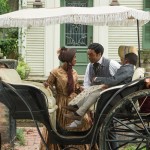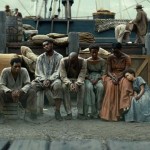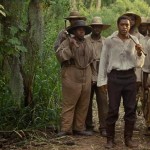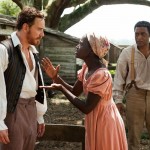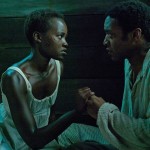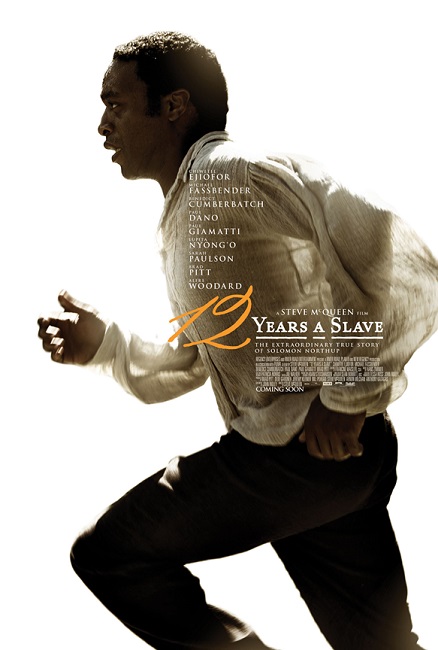
12 Years a Slave – 2013
This was one of those profound movies that displayed in graphic details the depths of human cruelty. Films like this are sometimes hard to watch, not only because of the scenes of violence and torture, but because of the severe injustices being portrayed. This film was about the slavery that was prevalent in 1841, and it showed many, though I’m sure not all, of the horrible conditions that went along with the practice of slavery.
The movie starred Chiwetel Ejiofor as Solomon Northup, a free colored man in Saratoga Springs, New York. He is shown to be an upstanding and respected member of his community, a good husband and a loving father. It was important to show his relationship with his community, because it would have bearing on the plot later on in the film. His wife and children go away on a planned trip, leaving him alone. He is a skilled fiddle player and makes his living as a hired musician.
Interesting note: When first offered the role, Ejiofor refused. When director Steve McQueen made the offer, he described it as the role of the actor’s lifetime. This actually scared Ejiofor away, because he thought he was not ready for such a high profile role and what it would mean to his career. Once he accepted, he actually learned to play the violin in preparation. He also immersed himself in the Southern plantation culture.
But then the pleasant story turns very dark as Solomon is hired by two strangers to play his fiddle in Washington D. C. He agrees to go and while there, he is drugged, put in chains and sold into slavery. He is transported to New Orleans and given a new name. Along with him are other free black citizens that have also been kidnapped, three of whom are a mother with her two children.
I had never given the matter of slavery much thought. I knew that Southern slaves were treated as less than dogs. I knew that they were bought and sold as property. But I had never imagined that free citizens were ever abducted from within our own borders to be made into slaves. The concept is just unthinkable.
Imagine being chained and taken away from your life against your will. Imagine being forced work hard every day from sun-up to sun-down for the benefit of others. Imagine being beaten and tortured at the whims of your fellow men. Imagine having to call another human being master.
To have been born into a life of slavery would have been bad enough. But to have been born a free man and then to have such a thing happen to you would have to have been a hundred times worse. It made the film that much more horrifying to watch. Ejiofor did a wonderful job and was so very real and convincing in his portrayal. The scene where he wakes up in chains really drew me in. I was horrified with him, though I knew just from the title of the movie what had to happen. The disbelief and despair on his face was incredibly well done.
A small cameo by one of my favorite actors, Paul Giamatti, surprised me. He plays the slaver who sells him to his new master, a man by the name of William Ford, played by Benedict Cumberbatch. He is actually a kind master, if you can call any slave owner kind, though it is important to note that he callously buys the mother of the two children without buying the children. They are cruelly torn from her and she never sees them again.
Now, not to belittle the events that take place in the film, which are based on true events, I do have to delve a little bit into the accuracy of the film. What I found made a certain amount of sense. The film was, for the most part, true to the autobiographical book, Twelve Years a Slave, Written by the real Northup. However, the book itself may not have been entirely accurate. You see, the book was written while Northup was working with the abolitionist movement. Some of the events may have been sensationalized for the purpose of the furthering the abolitionist cause. However, that being said, here is the only great inaccuracy that historians have been able to find.
As the abducted slaves are being transported by boat to New Orleans, one of the ship’s crew is drunk and wanders down to the slave pen to rape a woman. One of the other slaves tries to defend her. The boatman is ready with a knife and stabs the slave to death. This was not in Northup’s book and probably would not have happened. Slaves were a valuable commodity and the boatman did not own them. He would probably have been financially liable for the death. But from what I found in my research, the rest of the film was pretty true to life.
After an altercation with one of his white masters, Solomon is sold to a new master. He is Edwin Epps, played by Michael Fassbender. Epps is a cruel master who abuses his slaves and keeps them in deplorable conditions. He singles out a female slave named Patsey, played by Lupita Nyong’o, for her skill at picking cotton and her beauty. He repeatedly rapes her and beats her, sometimes simultaneously. His wife, Mary, played by Sarah Paulson, quickly develops an intense hatred of her and demands that she be sold. Ebbs refuses.
Nyong’o’s performance was enough to earn her the Academy Award for Best Supporting Actress. She really played the part well. There is one scene in particular in which she comes to Solomon to beg him to take her out into the swamp and kill her. He refuses, saying that he would not have the stain of murder on his soul. They both did such a great job. It made the whole whipping scene near the end of the movie that much more poignant.
I also have to give a special nod to Fassbender. He played the bad guy so well. Not only was he cruel and sadistic towards his slaves, but he was self-righteous about it, believing that such treatment of black people was his duty according to the Word of God. Which, by the way, how messed up is that? I was impressed with his performance, even though I hated the character.
Ultimately, the entire movie was well cast. Everyone played their parts well. There was another cameo by one of my favorite African-American actresses, Alfre Woodard. She played the favored mistress of a fellow plantation owner who had black slaves waiting on her. It was a small but memorable role. Brad Pitt, who also was one of the film’s producers, had a small put pivotal role near the end of the movie. He played Samuel Bass, a white man who is contracted to build a gazebo for Epps. He is sympathetic to the plight of the black slaves. He befriends Solomon who asks him to return to New York and bring his papers of freedom. This, he does, which allows Solomon to be finally freed and returned to his wife and family. Bass claimed to be Canadian, but Pitt made him look Amish. Also, the blonde highlights in Pitt’s hair looked very out of place for 1841. But never-mind that.
Another aspect of the film that I have to mention is the cinematography. The majority of the film takes place in the Deep South. Some of the transitional shots were of the natural beauty inherent in the Louisiana Bayou. The sunsets and sunrises were gorgeous with the beautiful trees indigenous to the region.
The overall message of the film was one that is often used in dramas of this nature: hope in the midst of horrific injustice. Time and again, I wondered if I would have had the will to continue to hope. Would I have been able to keep going under those kinds of terrible conditions, or would I have given way to despair? I don’t know. All I know is that I am glad such practices are, as far as I know, no longer tolerated in the United States. As for the rest of the world, I sadly have no doubt that such things still happen.
Nobody deserves to be treated like a slave, no matter what the circumstances. So perhaps movies like this are important. They are important as reminders of that shameful part of our history; important so that history would not repeat itself. There are still cruel men in the world today. There is still racism and hatred. There are still men who are capable of treating other human beings as animals.
And finally, I have to mention one last thing. This was actually something about the film that I didn’t particularly care for. The film was called 12 Years a Slave. So, apparently, he was a slave for 12 years. But that is the only indication in the movie as to how much time he spent as a slave. There was never any mention of the passage of time. How long had he been a slave when he was sold to Epps? How long had he been a slave when he met Patsey? I think that this kind of information would have made me more engaged in the story. And if you think about it, the plot is told through Solomon’s perspective. He was an educated man. He would have noted the passage of time like anyone who was taken away from his family.
I can’t even begin to imagine what it would be like to be in his situation, but the movie told a story that did a good job of putting me there. It never shied away from the graphic details of the atrocities that actually happened. In fact, I would guess that some of them were toned down a bit, though the whipping scene was pretty horrific. When it showed Patsey’s back afterword, it was terribly shredded. I imagine that performing such a scene would take an emotional toll on an actor. So I’ll give another nod to both Fassbender and Nyong’o for a job well done.
The film won two Academy Awards aside from Best Picture. Nyong’o won for Best Supporting Actress, and John Ridley won for Best Adapted Screenplay. In addition, it was nominated for 6 more awards: Best Director for McQueen, Best Actor for Ejiofor, Best Supporting Actor for Fassbender, Best Production Design, Best Costume Design and Best Film Editing.
Interesting note: This was the first time a film that was directed by an African-American has ever won the Best Picture Award.
Another interesting note: Northup’s original book sold very poorly when it was first published in 1853. Now, however, that it has been turned into an Academy Award Best Picture winner, the book’s sales have put it on the bestseller list.
